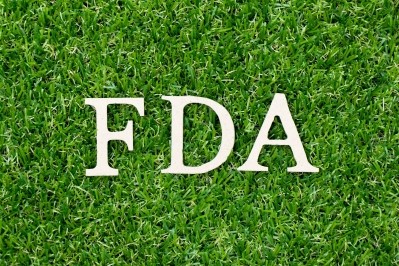FDA’s Tave highlights ‘Regulatory Gap’ for dietary supplements

Speaking during the 2020 Dietary Supplements Regulatory Summit (DSRS), Tave, who is the Director of the FDA’s Office of Dietary Supplement Programs, explained that a “regulatory gap” is the space that exists between what the law requires (ie. industry compliance), and what can realistically be reached through enforcement.
Noting that the Dietary Supplement Health and Education Act (DSHEA) was written in 1994 without the benefit of a crystal ball, Tave said that today – 26 years after the law was introduced – there exists a regulatory gap.
“We can’t responsibly ignore the regulatory gap or pretend it isn’t there,” Tave told attendees of the virtual summit. “That’s not in anyone’s interest – consumers, responsible industry, or regulators. All of us who expect or demand a better-regulated dietary supplement market share a duty to identify and pursue ways to narrow the regulatory gap.”
The DSRS is an annual collaboration between the Council for Responsible Nutrition (CRN) and the American Herbal Products Association (AHPA), the Consumer Healthcare Products Association (CHPA), the Natural Products Association (NPA) and the United Natural Products Alliance (UNPA).
A regulated industry
Tave also addressed the oft-cited criticism that the dietary supplements industry is not regulated. “It may not be the same level of regulation as drugs or some other FDA-regulated commodities, but it is a basic fact that dietary supplements are regulated.”
However, Tave added: “The question that really matters is this: Is the dietary supplement marketplace well-regulated? I think we can comfortably say, at a minimum, that the dietary supplement market isn’t perfectly regulated.”
And this is where the “regulatory gap” comes in. Taking cGMPs (one of the six main compliance elements*), Tave noted that the Agency typically inspects about 500 dietary supplement facilities a year, which represents fewer than 5% of all registered facilities. “To be clear, many firms take these requirements seriously and follow them faithfully,” he said.
However, he noted that many of the Agency’s inspections are follow-up inspections, so the number of facilities actually inspected is even lower.
“This is because the rate of non-compliance when we do inspect is very high – probably the highest it is for any FDA-regulated commodity, with frequent deficiencies in fundamental requirements like establishing specifications and testing to make sure that ingredients and products meet those specifications,” said Tave.
“From a consumer’s perspective, in light of what we do know, can you feel confident that any hypothetical dietary supplement is in full compliance?”
“Our enforcement program is active”
“Before I go any further, I want to address the myth, which we hear occasionally, that everything would be fine if FDA would just enforce the law. I’m not sure where that started, but can we please put it to rest? FDA can enforce the law, and we do so continually,” stressed Tave.
“In Fiscal Year 2019 alone, for example, we reported issuing at least 57 warning letters and filing one injunction and two seizures. The year before, it was at least 75 warning letters and 4 injunctions. And this doesn’t include criminal enforcement or import detentions, among other things. Our enforcement program is active.”
“The claim that FDA refuses to take action is frivolous, and it shouldn’t be taken seriously.”
Two industries evolving
Loren Israelsen, UNPA’s president and chief moderator for yesterday’s DSRS, told us that there is a resource scarcity for FDA, but expressed frustration with a lack of action.
“We have seen the industry grow and evolve post-DSHEA. We began at a common point – a Big Bang new beginning - and it took years for the regulatory framework to fill out. But two industries have evolved: One industry is those who have worked hard to comply and still do, and one is newer generation companies that see dietary supplements as an economic opportunity that doesn’t involve investment in quality and compliance. These companies likely end up online and they don’t support trade associations,” said Israelsen.
“For the portion of the industry so described, there is a regulatory gap. These companies don’t intend to invest in compliance and quality. So, what to do about it? For starters, it’s very difficult to find these companies. We would all like to see FDA go after these companies. I do think there’s a resource scarcity for FDA, but I have also grown frustrated when we see blatant and obvious non-compliance and FDA doesn’t act.
“We don’t carry the badges, and there’s only so much we can do. I would like FDA to assert itself against these companies that feel they can act with impunity.”
A “threat-liability gap”
Steve Mister, president & CEO, CRN, expressed a similar view, telling NutraIngredients-USA: “While we appreciate FDA’s position on its interpretation of a ‘regulatory gap,’ where the agency notes there is a divide between companies that are fully compliant with federal regulation and those whose violations are so apparent and egregious that they require an enforcement response, CRN believes this gap has expanded too far and caused a ‘threat-ability gap.’
“Too many companies are continuing to skirt the law and take advantage of the agency’s lack of enforcement, as there is little threat of disincentives or deterrence when they fail to comply,” added Mister. “This not only hurts responsible companies that do comply with federal regulation, but also threatens consumer safety and trust in the industry. CRN has worked to get more resources directed to the agency and we need FDA to use them and exert the political will to create a stronger industry.”
John Troup, PhD, VP of scientific affairs and dietary supplements for CHPA, told us that his organization agrees with the characterization of a “regulatory gap”.
“The changing dietary supplement market and increased consumer demand for these products requires industry diligence to ensure compliance with existing law,” said Dr Troup.
“We support strengthening FDA’s efforts to protect public health and their commitment to oversight by advocating for an update of DSHEA that includes Mandatory Product Listing as well as additional FDA resources to increase inspections and enforcement. These enhancements will help to ensure that all products marketed as dietary supplements are safe, manufactured according to GMPs and contain truthful claims backed by scientific evidence.”
Modernization
Tave also discussed the topic of a mandatory product listing for supplements, first touted by then FDA Commissioner Scott Gottlieb in February 2019. A mandatory product listing would require all products marketed as “dietary supplements” to be listed with the Agency.
“We believe it’s possible to construct a narrowly-tailored requirement that respects and preserves DSHEA’s original vision, does not impose any significant new burdens on responsible industry, and still facilitates our ability to act swiftly to protect consumers, better allocate resources, and remove illegal products from the market,” said Tave.
“Notably, we’re not alone in calling for mandatory listing. Many stakeholders support this proposal. None other than former Senator Hatch has said that it 'makes sense.' I applaud the industry leaders who have gone on record to publicly advocate for this change. Even though the easier path would be to stay silent on the sidelines, you recognize that this is a unique opportunity for real, common sense reform. And from the private conversations I’ve had with firms, I know that you’re not alone. Responsible industry is ready for this change and I look forward to working constructively with you all to make this a reality.”
Commenting on the mandatory listing issue, Dr Daniel Fabricant, NPA’s president and CEO (and previously director of the FDA’s dietary supplements division, before it was elevated to an Office), told us that this is FDA asking for more information, but then said that NPA provided a lot of information about beta-alanine for NDI enforcement and “the Agency did nothing with it”.
“This FDA is gun-shy,” he added. “They have to bring some big cases, and they won’t all be slam dunks every time.”
“There is a lot of good in the dietary supplement industry”
During his opening remarks, Tave also praised the industry stakeholders for their conduct during 2020.
“I learned fairly quickly in this job is that there is a lot of good in the dietary supplement industry,” he said. “I stand by that view, and I am even more convinced of its truth today. And though my comments at the time were focused on behavior related to the manufacture and distribution of dietary supplements, 2020 has shown that responsible participants in this community are committed to good, well beyond their own commercial interests.
“So many dietary supplement industry representatives have demonstrated leadership and courage during these tumultuous times. In op-ed pieces, in social media posts, and through other outlets, they’ve spoken loudly and clearly to show support for employees, business partners, customers, fellow citizens.
“Similarly, an unmistakable chorus of responsible dietary supplement voices recently spoke in unison, and on their own initiative, when there were suggestions that a dangerous ingredient might be made available to consumers as a dietary supplement for a facially inappropriate purpose.”
* Regulatory Framework
Firms’ Obligations:
– Facility Registration
– New Dietary Ingredient Notification
– Current Good Manufacturing Practices
– Dietary Supplement Labeling
– Structure/Function Notification
– Adverse Event Reporting
FDA is committed to DSHEA’s “twin pillars”, said Steven Tave:
– Preserving consumers’ access to safe, high‐quality, and accurately labeled dietary supplements,
– While protecting consumers from dangerous and unlawful products
















